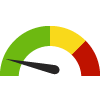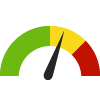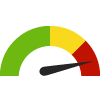Indicator Gauge Icon Legend
Legend Colors
Red is bad, green is good, blue is not statistically different/neutral.
Compared to Distribution
 the value is in the best half of communities.
the value is in the best half of communities.
 the value is in the 2nd worst quarter of communities.
the value is in the 2nd worst quarter of communities.
 the value is in the worst quarter of communities.
the value is in the worst quarter of communities.
Compared to Target
 meets target;
meets target;  does not meet target.
does not meet target.
Compared to a Single Value
 lower than the comparison value;
lower than the comparison value;
 higher than the comparison value;
higher than the comparison value;
 not statistically different from comparison value.
not statistically different from comparison value.
Trend

 non-significant change over time;
non-significant change over time; 
 significant change over time;
significant change over time;  no change over time.
no change over time.
Compared to Prior Value
 higher than the previous measurement period;
higher than the previous measurement period;
 lower than the previous measurement period;
lower than the previous measurement period;
 no statistically different change from previous measurement period.
no statistically different change from previous measurement period.
 Significantly better than the overall value
Significantly better than the overall value
 Significantly worse than the overall value
Significantly worse than the overall value
 No significant difference with the overall value
No significant difference with the overall value
 No data on significance available
No data on significance available
Mothers who Smoked During Pregnancy
This indicator is archived and is no longer being updated. Click to learn more
Why is this important?
Smoking during pregnancy increases the risk of pregnancy complications, preterm delivery, birth defects and low birth weight in infants. Providing screening and counseling during prenatal care visits can help pregnant individuals stop smoking (Healthy People 2030, Centers for Disease Control and Prevention). Population-based interventions, like cigarette price increases, media campaigns, and comprehensive smoke-free laws, can also help prevent pregnant people from smoking (Healthy People 2030).
Considerations for Equitable Approaches: A commitment to health equity involves understanding health disparities related to commercial tobacco* and underlying factors that lead to disparities in smoking. Evidence shows variations in tobacco retailer concentration in certain communities may contribute to disparities in tobacco use as tobacco retailer density is greater in areas with higher proportions of households receiving public assistance, as well as counties with a higher proportion of African American residents, same-sex couples, and rural residents (Centers for Disease Control and Prevention, Centers for Disease Control and Prevention, Office of Smoking and Health).
*“Commercial tobacco” means harmful products that are made and sold by tobacco companies. It does not include “traditional tobacco” used by Indigenous groups for religious or ceremonial purposes.
Inclusive Language Recommendations: As not all people who are pregnant identify as women, recommendations for more gender-inclusive language include using "pregnant people" and "pregnant patients" or other wording as applicable when referring to general recommendations for pregnancy (National Institutes of Health).
| Health District | Source | Measurement Period | Percent | |
|---|---|---|---|---|
Data Source
- Virginia Department of Health, Division of Health Statistics
Maintained By: Conduent Healthy Communities Institute (Methodology)
Filed under: Health / Maternal, Fetal & Infant Health, Health / Alcohol & Drug Use, Health Behaviors, Women
